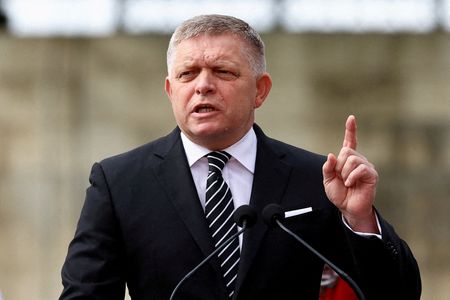(Reuters) -The European Commission opened a case against Slovakia on Friday over what it said was a breach of EU law after the country amended its constitution to assert national sovereignty over matters such as gender and family law.
Slovakia, under the leadership of pro-Russian populist Prime Minister Robert Fico, has increasingly clashed with European Union partners over the bloc's stance toward Russia's invasion of Ukraine, climate policies and social issues.
In September, Slovakia adopted a constitutional change which said local laws would take precedence over EU legislation in matters concerning national identity, including family and gender, which Fico said was a "dam against progressivism".
The Commission said on Friday it had sent a letter of formal notice to Slovakia over the changes. Slovakia said in reaction that amending the constitution because of the proceedings was out of the question.
TOUGHER RELATIONS WITH EU
"This (change) contravenes the principle of the primacy of EU law, which is a fundamental element of the EU legal order, together with the principles of autonomy, effectiveness, and uniform application of Union law," the Commission said in a statement.
"Even when a Member State amends its constitution, such an exercise of national competence cannot circumvent the need to comply with fundamental principles of Union law."
Slovakia has two months to respond.
Fico told a televised briefing the amendment only touches issues of national identity, not other areas where the EU has legislative rights, and that he considered the constitutional article to be in line with EU law.
"There will be no change to the constitution. It is out of the question, and there is no reason for it," Fico said.
The constitutional amendment states that male and female will be the only recognised genders, and that school curriculums must respect cultural and ethical positions enshrined in the constitution. It also tightens rules on adoption.
Fico has railed against liberal democracy and spoken of benefits of government efficiency in undemocratic countries.
He has also called for limiting the number of parties in Slovakia to make forming governments easier.
Last week, Fico said that while the EU was a great project, it was not well led. He has also spoken of the need to be prepared for the bloc's potential collapse.
Slovak pro-Western opposition has accused Fico of laying the groundwork for exiting the EU.
Fico has met Russian President Vladimir Putin since Russia's 2022 invasion of Ukraine, including a private meeting in December 2024.
After protests against his pro-Russian stance following that trip, he accused opposition activists of preparing a coup.
Tens of thousands protested across Slovakia against Fico's policies on the November 17 anniversary of the 1989 end of communist rule.
(Reporting by Jan Lopatka and Jason Hovet in PragueEditing by Gareth Jones and Susan Fenton)







